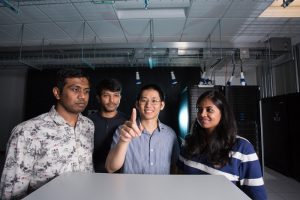Research has broad implications for health care, self-driving cars and more.
Imagine cruising down a highway in your self-driving car. Its operating system relies on algorithms based on data collected during dry driving conditions. But what happens when the car has to navigate through high winds, hard rain and street flooding?
“This is a naturally occurring situation where the characteristics of the data will change,” said Hien Van Nguyen, assistant professor of electrical and computer engineering at the UH Cullen College of Engineering. “So it’s very likely that in those circumstances the machine learning models in place will fail.”
In such situations, time is of the essence.
“You can’t stop the self-driving car in the middle of the highway in a storm and say ‘Hey, I’m going collect more data and retrain the machine,” he said. “The car needs to adapt quickly. It’s a safety issue.”
Nguyen wants to advance machine learning algorithms to go beyond generalizations and respond appropriately when situations change.
The National Science Foundation awarded Nguyen a two-year, $225,000 grant for a related research project titled “Active and Rapid Domain Generalization.”
“The main goal of this project is to develop technologies that will help machine learning models adapt to changes without having to collect a lot of data and without having to take the machine offline to retrain the models from the beginning,” Nguyen said.
The need for adaptability exists across different fields – from the medical sector to offshore oil and gas operations.
“For example, with the current machine learning technology I can build a model to detect lesions on Caucasian skin,” Nguyen said. But it wouldn’t be useful in a large, multicultural metropolitan area like Houston. “If I try to use that same model on Asian, Latino or Black skin, it is likely to fail because there are subtle differences.”
The offshore drilling industry, with its miles of submerged pipes that must be maintained, is another potential end user.
“Underwater robots could inspect pipelines for cracks and loose bolts so those problems could be fixed before there is the risk of damage to the ocean,” Nguyen said. But the situation is often complicated by sea organisms that are naturally attracted to pipes.
The loose bolt can be detected by analyzing a tap-tap-tap sound made on a pipe; the sound will be clear if the pipe is fine or muffled by a recognizable vibration if a bolt is loose. But the sound will be altered in areas where seaweed or barnacles have grown around a pipe or bolt, which happens often.
“So we are addressing a very fundamental and annoying limitation of machine learning,” said Nguyen, who is also director of the Houston Ubiquitous Learning Algorithms (HULA) Research Lab.
“If you don’t have an algorithm that effectively detects and quickly adapts to changes in the data characteristics, machine learning would not be applicable or useful in many domains.”
Nguyen’s research aims to expand those capabilities and others. The NSF grant began on Aug. 1 and will continue through July 31, 2021.
Two Cullen College doctoral students, Aryan Mobiny and Pengyu Yuan, are assisting with the research and two more researchers are expected to join the team next spring.
The UH project is being conducted in collaboration with researchers at Johns Hopkins University, where a parallel project is led by Vishal M. Patel, assistant professor of electrical and computer engineering.
“I’m very excited to receive this award as visual domain adaptation is an important research topic and an area I have focused on for several years,” Nguyen said. “This work has a lot of implications and applications in a number of different fields including medical imaging, computer vision, self-driving cars and speech recognition.”

